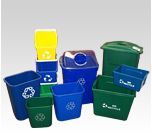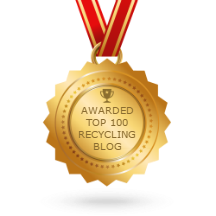 A simple step—providing employees with a desk-side recycling bin along with smaller trash bin—can lead to a 20% increase in office recycling, according to a new study.
A simple step—providing employees with a desk-side recycling bin along with smaller trash bin—can lead to a 20% increase in office recycling, according to a new study.
The “Recycling at Work” study was commissioned by Keep America Beautiful. The study was aimed at defining best practices for recycling programs that foster improved recycling behaviors in the workplace and result in an increase of quality and quantity of materials collected.
The research focused on the effects of office bin placement on recycling rates and level of contamination as well as other important factors to consider when setting up a workplace recycling program.
"We want to get smarter and better understand how we can be most effective at getting individuals to recycle more and recycle more of the right things," says Brenda Pulley, from Keep America Beautiful. "Much of the focus has been on curbside recycling, as it should be, since that's the low-hanging fruit. But when you look at other opportunities, the workplace setting appears ripe for making inroads."
The EPA has estimated that 45% of municipal solid waste is generated in workplace settings. That estimate may be too high, it still underscores the overall opportunity for improving recycling rates by reducing waste in those settings.
Four conditions were tested in offices in Atlanta, Boston, Houston and San Diego. Each city has single-stream recycling programs.
- “Equal-size” provided employees with two equal sized recycling bins, one for recycling and one for trash. This is one of the more common office set-ups.
- “Recycling only” provided employees only with a desk-side recycling bin, but no trash bin. The set-up was meant to draw attention to recycling while making it more difficult to dispose of trash.
- “Little trash” gave employees a desk-sized recycling bin equipped with a small hanging trash bin. Having both bins makes recycling convenient while increasing the difficult of generating large amounts of trash.
- Lastly, a control group was provided only with recycling information without a change in their office setup.
All conditions received an informational flyer on 10 items commonly found in offices—five recyclable items and five trash items. Recycling bins were also stamped with a logo created for the project featuring three common recyclable items—an aluminum can, a plastic beverage bottle and office paper. Meanwhile, trash bins were stamped with a “landfill” logo.
The results from the research were compared to baseline audits conducted before the new bins were put in place.
The study found that the “little trash” condition had the best results.
The “little trash” approach yielded improved quality of material collected in the recycling bin—an increase of 20 percent in the quality of recyclables—along with a significant increase in knowledge about recycling and proper recycling behavior. With the “Little Trash,” offices significantly increased the proportion of material in the recycling bin that was actually recyclable and decreased the amount of trash collected in the bin. There was also a decrease in the amount of recyclables improperly placed in the trash bin, especially that of office paper. Paper in the trash bin was reduced to nearly zero. Moreover, the respondents of the “Little Trash” approach had a positive experience with the program.
Pulley says. "We know that convenience matters. We know that ongoing, clear, concise communication matters. We know that having a champion matters. What we’re trying to do is figure out how to be most effective in those areas."
The data showed that use of the small bin resulted in "a 20 percent improvement in the quality of the recycling stream," Pulley says.
In terms of next steps, Pulley says KAB plans to promote the results of the study and share examples of the signage that was used in the test workplaces. It will also conduct additional studies.
Based on the frequency of the 10 targeted items in the recycling and trash, the study suggests the following items should serve as higher priorities for an office recycling program:
- Office paper is the most frequently recycled material, but it was still present in the trash in 50 percent of offices.
- Plastic beverage bottles and aluminum beverage cans are about equally present in recycling bins and trash bins. Similar to paper, these materials remain a priority.
- Paper towels were very frequently ending up in the recycling bin, with a steady decrease of presence over the course of the project.
- Food scraps had enough of a similar pattern to deserve a priority focus, though they were not present in recycling bins as frequently as paper towels.
For more information on desk-side office recycling containers, contact the Fibrex Group.
Waste360
The Fibrex Group is pleased to manufacture our Mobius DS1 unit for the Unifi production facility in Brazil, South America. This facility produces the Repreve recycled fiber that is then turned into fabrics for major retailers such as North Face, Quiksilver, Volcom, Roxy and Patagonia (to name a few).







































